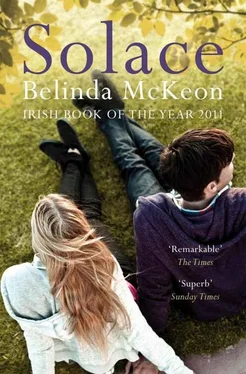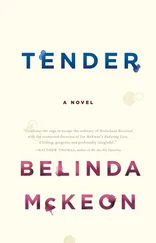‘Mark?’ Grace said, and he looked at her. Her face was a study of concern.
‘I don’t think I know him,’ he said.
Grace smiled. ‘Well, he dropped that in for you. Asked me to make sure you got it. I was going to post it out to you, but I thought. .’
‘Did he say what it was about?’ Mark said, indicating the envelope.
Grace shook her head slowly, sadly, the way she always shook her head at him now. It had been months since he had seen the old brusque Grace. ‘Maybe he heard about what happened.’
Talking to you, it wouldn’t have taken him long to find out, Mark wanted to say, but he just nodded. ‘Anyway, thanks. You’ll give that draft to Maurice?’
‘I will, of course,’ Grace said. ‘He’ll be amazed you have another draft in to him so quickly. I know he’s hoping to get a chance to talk to you about the other one.’
‘Well, I’m around,’ Mark said. ‘Tell him I’ll come in whenever he wants to talk to me. I can come in again tomorrow if it suits.’
Grace looked uncertain; she looked, Mark realized, embarrassed. ‘I think he’s away tomorrow,’ she said, and she frowned down at the diary which lay open on her desk. ‘I think he has a conference in Galway. But I’ll be sure to tell him you’re ready to talk to him.’
‘Very ready,’ Mark said, pulling on his backpack.
‘How’s Aoife?’ Grace smiled.
‘She’s great,’ Mark said, and he left the office before she could ask any more.
*
On the front of the card there was an image of a moon in a pale sky, its light mirrored and muddled in an ocean. The writing inside was neat and slanted, the same black ink covering almost all of the white space. He looked first for the signature, and it was the name Grace had given him, and below it was an address and a phone number.
Dear Mr Casey,
You will not know me. I was a teacher and, I dare to presume, a friend of your Joanne. It was with great sadness and shock that I learned of her death from our department secretary this week. Please forgive my not having written sooner.
When last we met, Joanne mentioned that you were writing your doctorate in the School of English. I hope that this letter will reach you from there. Joanne was a favourite of mine, always a favourite. It was a joy to see her so recently, and to meet with your little girl. That was in the spring, and I realize now that it must have been very shortly before the accident. The things we cannot see. Joanne seemed to me very happy that day. Her pride and delight in your daughter was clear.
I am rambling. Your Joanne knew that this has always been something to which I have been prone. If ever you feel like being in touch, I would like that. The number and the address are below. Again, I am sorry for your loss, and sorry, too, that words cannot be of use in trying to make sense of such a thing.
Sincerely,
Clive Robinson
The address was in Ranelagh; Ashfield Avenue. Mark looked again at the card’s illustration. The moon was a clumsy thumbprint in an insipid sky. He turned it over; it had come from the National Gallery. In their first weeks together, he and Joanne had gone there on a date one weekend afternoon. They had seen something about Beckett, some grouping of paintings and drawings that, supposedly, Beckett had liked. This was the kind of worthy thing you did on a date early on, when you were still trying to impress each other, still telling each other stories about the kinds of people you were. When you were not facing into having a baby together after having been together for only a matter of weeks. And later, if you got to that later, you would see through those stories that you’d told each other, but by then it wouldn’t matter, either because you no longer cared about each other, or because you really did, because you no longer cared about anything else. Sometimes, Mark didn’t know if he and Joanne had even reached that point. Twenty months: was that enough time? To really know each other? She had never mentioned this guy to him, for instance, this Clive Robinson. Or maybe she had. Maybe she had, and he hadn’t heard her. Or remembered. Or maybe he had heard her, and remembered for a little while, and maybe, now, it was gone. Maybe it was just one of the countless things he had been unable to keep.
*
His father called three times that afternoon, but Mark did not answer. He was in the kitchen, reworking his chapter, making notes on a letter from Edgeworth to Scott. He thought now that he had taken an entirely wrong approach in the draft he had just finished, the one he had delivered to McCarthy; he had failed, in that draft, to place enough emphasis on Edgeworth’s correspondence, on particular letters she had written to Scott and to her aunt. He was becoming certain, now, that it was in the letters — in their style, in their curious marriage of formality and gossip — that he would find the key to everything he wanted to do in his research. He wanted to gather the letters, as many of them as he could, and he wanted to read them all the time. He had been avoiding them, procrastinating on getting around to them, for months — for years — and now he had found that they were what he had been looking for all along. There was such pleasure in hunting through them. In matching up the phrases between one person and another. In finding their intimacies, in finding their news. He wanted to start the whole thesis over now, not just this chapter — he wanted to do the whole thing differently. That night he stayed at the kitchen table, working, until he was disturbed by Aoife’s cries from upstairs. He was surprised to look up and discover that, outside, it was almost dawn. He did not go up to her immediately. He needed to finish a sentence before he could do that: he knew if he walked away from it he would never be able to make the point in the way it needed to be made.
After he had fed Aoife, he put her in front of her DVD and went upstairs to take a shower. He needed it. He felt sticky from having sat up over his work all night, and he knew he must smell bad. When he stepped out of the shower, he could hear Aoife screaming downstairs. He wrapped a towel around himself and hurried down to her, calling to her, his heart racing. When he saw that she was not hurt, the relief that coursed through him was like physical pain. Her DVD had ended, and he had not been there to change it: that was all that was wrong. That was why she was crying, shouting, standing in front of the television, banging at its screen with the remote. He went over to her. He lifted her, and he took the remote out of her hand. Then he saw that it was not the remote. It was his phone, and as he looked at it more closely, he saw that the screen was displaying the tiny graphic of a handset, which meant that it was on a call. Slowly, cautiously, Mark lifted the phone to his ear. It was his father’s voice he could hear. He was saying hello, over and over. Mark slipped the phone back into his palm and pressed a button to cancel the call. In his arms, Aoife howled and pointed to the television. He sat her on the couch and changed the DVD; she calmed. In his pocket, he felt the vibration of his phone. He let it ring out.
*
He went to the library later to borrow another book of letters. On his way there, he called into the DVD store. Mossy took Aoife in his arms and talked to her; he took her to the back of the store, where they kept the children’s films. Aoife reached for the cases and flung them to the floor. Mossy picked them up and asked her which ones she wanted. She did not answer him, and Mark chose three for her.
‘You don’t want anything yourself?’ Mossy asked. ‘There’s some good stuff just in, new releases.’
‘I’ve plenty to keep me going,’ said Mark.
Читать дальше












